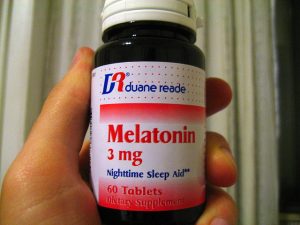Insomnia and Melatonin
Are you suffering from insomnia and tried everything? According to a number of studies, melatonin could be the answer to your sleepless nights.
What is Melatonin?
Melatonin is the only hormone produced by the pineal gland and is secreted into the bloodstream. Melatonin release is controlled by diurnal rhythm so greater levels are seen at night and decreased levels during the day. The scientific name for melatonin is N-acetyl-5-methoxytryptamine.
What Does Melatonin Do?
Melatonin’s main role is the regulation of the body’s circadian rhythm, sleep patterns and certain endocrine secretions. As mentioned before, production is controlled by day and night, light inhibits production and darkness stimulates it.
People whose lifestyle prohibits the amount of light they receive can then have problems such as growth problems, sexual maturation, balance and pain control.
Many people such as those living in the northern hemisphere or shift workers, aren’t exposed to as much light as they possibly need. However, some people such as those with bipolar disorder have an abnormal response to light. Before attempting to treat your insomnia, please consult your doctor for tests that may indicate a differential diagnosis.
What Health Problems Can Melatonin Treat?
People use melatonin for a number of health conditions but not all conditions have been proven to be beneficial.
These may include:
Chronic Fatigue Syndrome (CFS)
Depression
Tinnitus
Attention Deficit Hyperactive Disorder (ADHD)
Irritable Bowel Syndrome
Insomnia
Delayed Sleep Phase Syndrome (DSPS)
Hypertension
Breast Cancer
Epilepsy
Menopause
Does Melatonin Really Help Insomnia?
Due to the latest research, it has been found to help in cases of insomnia.
According to Garfinkel D, et al. Lancet 1995;346:541-44, elderly patients with a marked melatonin deficiency respond well to melatonin supplementation when suffering from insomnia.
In another study melatonin was found to be helpful in sleep quality but does not improve the amount of time to fall asleep.
In children studies it was noted that melatonin shortens the time it takes to fall asleep when there is decreased production of melatonin.
According to Dolberg OT, Hirschmann S, Grunhaus L. Am J Psychiatr 1998;155:1119-21. Patients with depression have a marked improvement with insomnia when supplemented with melatonin.
Does Melatonin have Any Side-Effects?
Melatonin is generally well tolerated but some people have reported experiencing drowsiness in the daytime, headache and to a lesser extent, dizziness.
Does Melatonin Interact with Other Drugs?
Yes, consult your health practitioner if you are taking the following medications:
Anticoagulants
Anti-diabetics
Benzodiazepines
Caffeine
Contraceptives
Flumazenil
Fluvoxamine
Immunosuppressants
Please consult your health practitioner if you are considering using melatonin. In some countries, melatonin is regulated but in others they may be unregulated and unsavoury. Make sure the melatonin comes from a reliable source such as your health practitioner or registered pharmacist.





